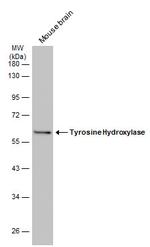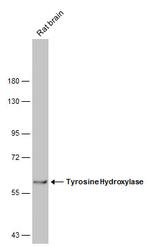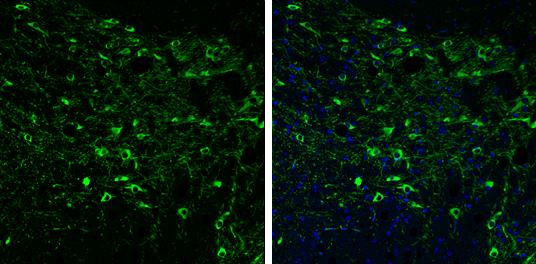Search Thermo Fisher Scientific
Invitrogen
Tyrosine Hydroxylase Monoclonal Antibody (GT234)
FIGURE: 1 / 4
Tyrosine Hydroxylase Antibody (MA5-38252) in IHC (P)




Product Details
MA5-38252
Species Reactivity
Host/Isotype
Class
Type
Clone
Immunogen
Conjugate
Form
Concentration
Purification
Storage buffer
Contains
Storage conditions
Shipping conditions
RRID
Product Specific Information
Centrifuge briefly prior to opening.
Target Information
Tyrosine hydroxylase (TH) is an enzyme involved in the synthesis of catecholamine neurotransmitters dopamine, epinephrine, and norepinephrine. In all species, catecholamine synthesis is regulated by the interaction of TH with a cofactor, tetrahydrobiopterin (BH4). BH4 binds to the TH catalytic domain, resulting in enzymatic activity. Unlike TH in non-primate species, four human TH mRNA splice variants (hTH1-hTH4) have been isolated. These variants are identical in their catalytic domain, but differ in their N-terminal, regulatory domains. TH is also responsible for the conversion of L-tyrosine to L-dopa. TH plays a key role in the physiology of adrenergic neurons. The role of TH in the synthesis of catecholamine neurotransmitters suggests a correlation between the enzyme and a number of neuropathogenic diseases including: Parkinson's disease, schizophrenia, Segawa syndrome, and dystonia, as well as a variety of cardiovascular diseases.
For Research Use Only. Not for use in diagnostic procedures. Not for resale without express authorization.
References (0)
Bioinformatics
Protein Aliases: dystonia 14; EC 1.14.16.2; HGNC:11782; TH; TH isoform 3; TH isoform a; TH-4; TY3H; TYH antibody; Tyrosine 3-hydroxylase; Tyrosine 3-monooxygenase
Gene Aliases: DYT14; DYT5b; TH; The; TYH
UniProt ID: (Human) P07101, (Mouse) P24529, (Rat) P04177
Entrez Gene ID: (Human) 7054, (Mouse) 21823, (Rat) 25085

Performance Guarantee
If an Invitrogen™ antibody doesn't perform as described on our website or datasheet,we'll replace the product at no cost to you, or provide you with a credit for a future purchase.*
Learn more
We're here to help
Get expert recommendations for common problems or connect directly with an on staff expert for technical assistance related to applications, equipment and general product use.
Contact tech support
